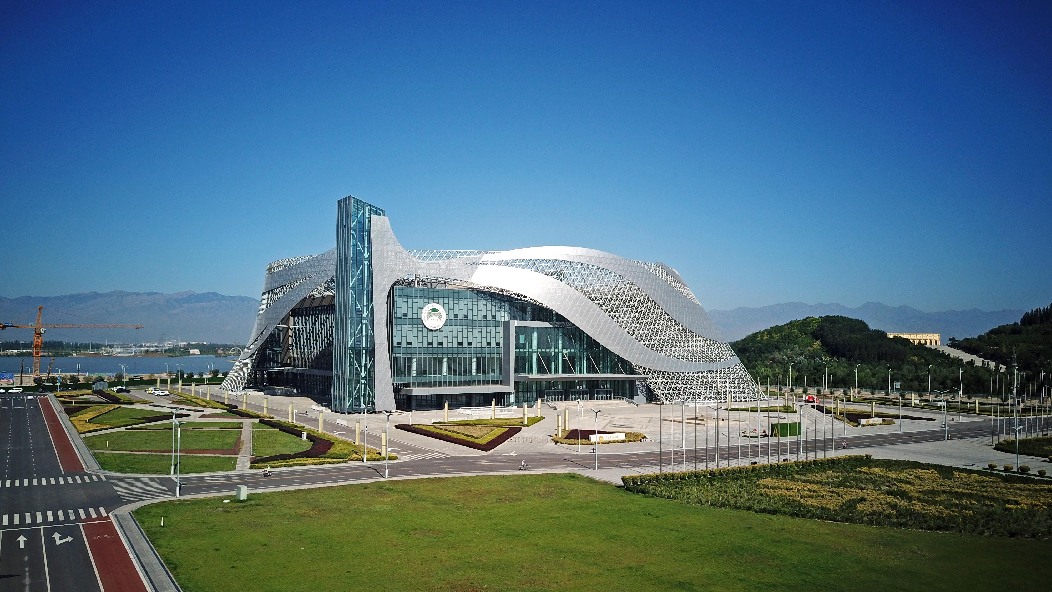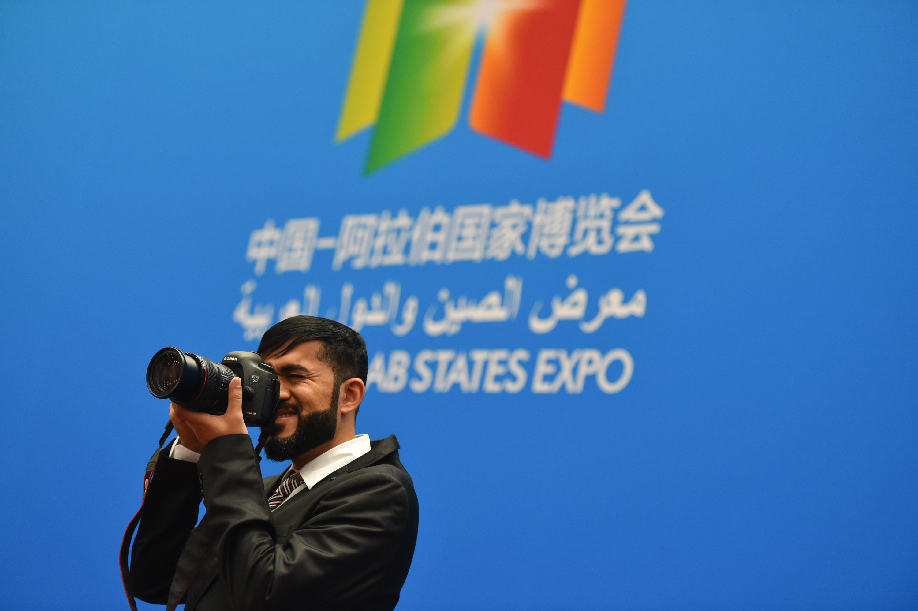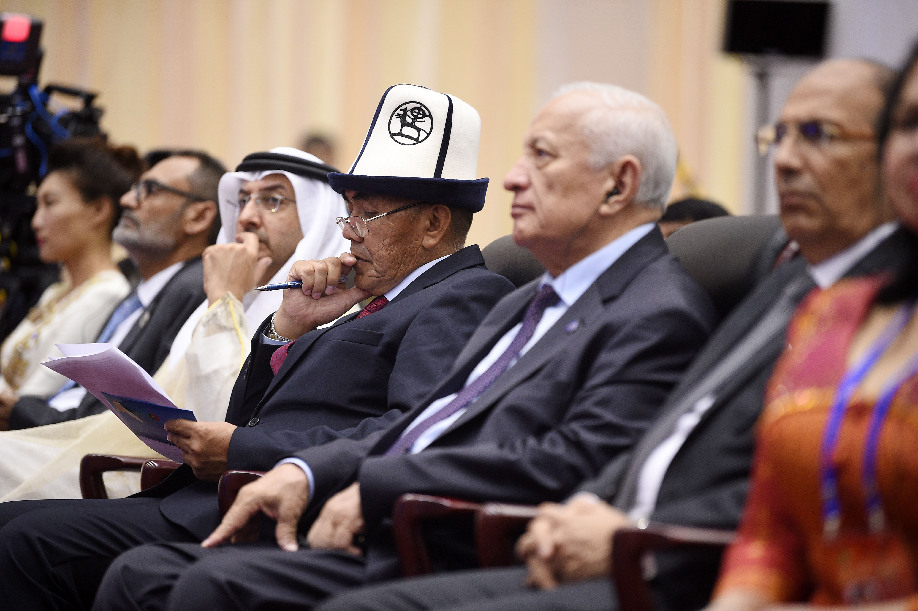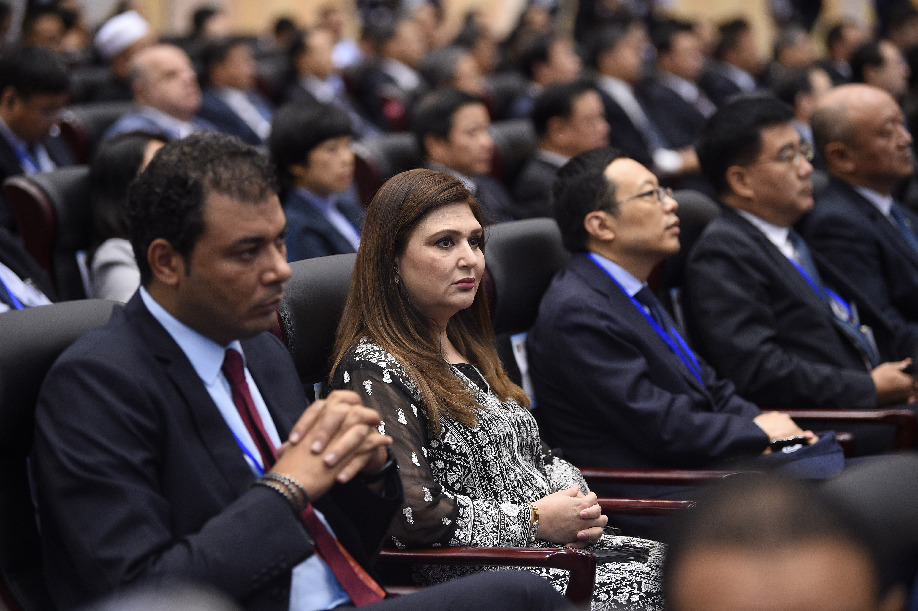The fourth China-Arab States Expo will offer a beneficial platform for the two sides to deepen pragmatic cooperation and push forward high-quality development of the Belt and Road, Xi said in the congratulatory letter.
Inaugurated in 2013, the China-Arab States Expo has become an important platform for China and Arab countries to jointly pursue the BRI.
China has become the Arab world's second largest trading partner; the largest trading partner of the UAE, Saudi Arabia and Iraq; Kuwait's largest non-oil trading partner; Egypt's second largest trading partner; Qatar's third largest trading partner.
CAIRO/YINCHUAN, Sept. 5 (Xinhua) -- Following the trend of the times and respective development needs, China and the Arab states have in recent years made joint efforts in advancing the Belt and Road and achieved fruitful results, said Chinese President Xi Jinping in a congratulatory letter to the fourth China-Arab States Expo that opened Thursday.
At the four-day exhibition in northwest China's Ningxia Hui Autonomous Region, more than 12,600 representatives from across the world are seeking opportunities for cooperation. Over the past years, with joint efforts, the expo has become an effective mechanism to enhance the booming trade and exchanges.

Aerial photo taken on Aug. 14, 2019 shows a view of Ningxia International Hall, the site of the fourth China-Arab States Expo, in Yinchuan, capital of northwest China's Ningxia Hui Autonomous Region. The fourth China-Arab States Expo opened Thursday in Yinchuan. (Xinhua/Wang Peng)
BENEFICIAL PLATFORM
Mohamed Khalil, the first doctor to create a medical center for traditional Chinese medicine in Morocco, is heading to the expo. Visiting the expo has always been an interesting experience for him to find out new things that can help China and participating Arab countries.
"The expo is very important to develop the relations between China and the Arab world," said Khalil, also president of the Morocco-China Friendship and Exchange Association.
Since 2010, Ningxia has seen three editions of the China-Arab States Economic and Trade Forum, and then the expo as an upgraded version of the forum. Representatives from over 140 large business associations, and 7,732 large and medium-sized enterprises and financial institutions have participated.

A journalist takes photos during the opening ceremony of the fourth China-Arab States Expo in Yinchuan, capital of northwest China's Ningxia Hui Autonomous Region, Sept. 5, 2019. The fourth China-Arab States Expo opened Thursday in Yinchuan. (Xinhua/Li Mangmang)
"Exhibitions are essential for knowing products and cultures of other countries," said Essam Sharaf, former Egyptian prime minister. "Exhibitors will explain about their products, so visitors can also know more about their cultures and living conditions."
Sharaf also considered the expo a platform to see what sci-tech development China has achieved, like its leading 5G technology.
"The expo is a platform gathering different clusters of scientists, technology transfer officials, and industry," said Shaimaa Helal, head of the Egypt-China Technology Transfer Center.
This year's expo attracts representatives from over 2,900 regional organizations, business associations, institutions and enterprises from around the world. It includes exhibitions and investment and trade promotion activities in modern agriculture, high technology, infrastructure and international logistics.
The fourth China-Arab States Expo will offer a beneficial platform for the two sides to deepen pragmatic cooperation and push forward high-quality development of the Belt and Road, Xi said in the congratulatory letter.
Jamil Dababat, a journalist from Palestine, is reporting on the expo for the first time. As more countries along the Belt and Road routes, including ones from Europe and Latin America, join the expo, "it is international, and the platform is very open," he said.
"This year the expo focuses more on business and trade," Dababat said. "It becomes more professional and pragmatic."
Kristina Uptain, a representative of the enterprise U2M INVEST, is also attending the expo, and has met people from many countries around the globe. She, along with Moroccan partners, plans to take part in a forum for investment in overseas industrial parks.
The expo's grandness gives attendees a reason to believe that the platform will become larger and more efficient, said Uptain.
BOOMING COOPERATION
Abdulla Al Saleh, undersecretary for foreign trade at the United Arab Emirates (UAE) Ministry of Economy, is leading a delegation to the expo. They are expecting to explore more cooperation in finance, food and renewable energy.
Official statistics show China-UAE trade hit 45.92 billion U.S. dollars in 2018, up 12 percent from 2017. In 2018, the Gulf nation invested in 31 projects and businesses in China.
The booming China-Arab cooperation benefits more. Here are some rankings: China has become the Arab world's second largest trading partner; the largest trading partner of the UAE, Saudi Arabia and Iraq; Kuwait's largest non-oil trading partner; Egypt's second largest trading partner; Qatar's third largest trading partner.

Aerial photo taken on Aug. 14, 2019 shows a view of Ningxia International Hall, the site of the fourth China-Arab States Expo, in Yinchuan, capital of northwest China's Ningxia Hui Autonomous Region. The fourth China-Arab States Expo opened Thursday in Yinchuan. (Xinhua/Wang Peng)
More projects have been developed under the China-proposed Belt and Road Initiative (BRI) and a Sino-Arab future-oriented strategic partnership of comprehensive cooperation and common development.
The Chinese projects in Yanbu in Saudi Arabia include the building of five 660-megawatt oil-fired power plants and a 550,000-cubic-meter seawater desalination facility.
In the Moroccan city of Ouarzazate, the gateway to the Sahara Desert, two of the world's largest solar power plants were constructed by Chinese company SEPCO III and had delivered hundreds of millions of kilowatt-hours of electricity to the Moroccan grid as of January, and offered over 13,000 job opportunities for local residents in over three years.
In Ramallah, a Palestinian city in the central West Bank, a Chinese-funded project worth 8 million dollars was launched last November to pave nine roads with a total length of more than 7.5 km to help ease the traffic problem there.
In Iraq's eastern province of Wasit, a huge power plant, the largest in the country, is being constructed by Chinese companies and designed to produce some 20 percent of Iraq's total power supply.
China and the Arab states are jointly building a "Space Silk Road" with the application of China's Beidou Navigation Satellite System, which has been applied in many Middle Eastern countries including Tunisia, Algeria, Kuwait and Sudan for precision agriculture, telecommunications, maritime monitoring and disaster relief.

Guests attend the fourth China-Arab States Expo in Yinchuan, capital of northwest China's Ningxia Hui Autonomous Region, Sept. 5, 2019. The fourth China-Arab States Expo opened Thursday in Yinchuan. (Xinhua/Wang Peng)
What's behind these economic achievements is boosted political ties.
Xi paid state visits to Egypt and Saudi Arabia in 2016, and the UAE in 2018. Among Arab leaders who have visited China in the past years are Palestinian President Mahmoud Abbas, Egyptian President Abdel-Fattah al-Sisi, King Salman bin Abdulaziz Al Saud of Saudi Arabia and King Mohammed VI of Morocco.
Calling the Arab states China's natural partners in Belt and Road cooperation, Xi said at the opening ceremony of the eighth ministerial meeting of the China-Arab States Cooperation Forum in July 2018 in Beijing that the cooperation had energized every dimension of Sino-Arab relations and propelled Sino-Arab all-round cooperation into a new phase.
The success of both China-Arab states' cooperation and China's development can mainly be attributed to China's opening-up and the BRI, said Sharaf, now a committee member of the Silk Road NGO Cooperation Network. Arab and African states can expand cooperation with China and learn from China's experience, for example in infrastructure, through the BRI, he added.

Guests attend the opening ceremony of the fourth China-Arab States Expo in Yinchuan, capital of northwest China's Ningxia Hui Autonomous Region, Sept. 5, 2019. The four-day event will feature trade fairs and forums on infrastructure, Internet plus healthcare, high technology, modern agriculture, logistics, tourism, digital economy and industrial cooperation. (Xinhua/Wang Peng)
Inaugurated in 2013, the China-Arab States Expo has become an important platform for China and Arab countries to jointly pursue the BRI.
In his congratulatory letter, Xi expressed hope that the two sides could seize the opportunity and tap the potential to jointly promote their strategic partnership to make greater progress for the benefit of the people from both sides.
(Video reporters: Lu Ying, Su Xiaopo, Huang Ling, Chen Binjie; Video editor: Ma Zheng)



